It can be incredibly frustrating to experience your vehicle overheating while driving at higher speeds. But without having any choice, you must slow it down and identify the reasons.
Then you can go ahead to find out why does a car overheat at high speed? Several problems can lead to a car overheating at high speeds. In general, this occurs due to
- A faulty thermostat, A blocked radiator
- Low coolant level, A malfunctioning radiator, A weak water pump, etc.
We will examine the frequent reasons why cars overheat while traveling at high speeds. We will also show the ways of solutions that may be effective in resolving the problems. Additionally, other relevant information will also be discussed.
Why Does A Car Overheat At High Speed? : Causes And Fixes

There are some general causes for a car overheating at high speed. Let’s have a quick look at some general reasons and the fixes.
| Problems | Fix |
| Malfunctioning radiator | Replace the radiator |
| Coolant level is low | Top off coolant levels |
| Faulty thermostat | Replace the thermostat |
| Clogged radiator | Clean or replace radiator |
| Weak water pump | Replace water pump |
| Clogged air filter or engine belts problem | Replace air filter or engine belts |

Note that the causes and fixes may vary depending on the specific make and model of your car. It is usually advisable to have the issue identified and fixed by a trained professional.
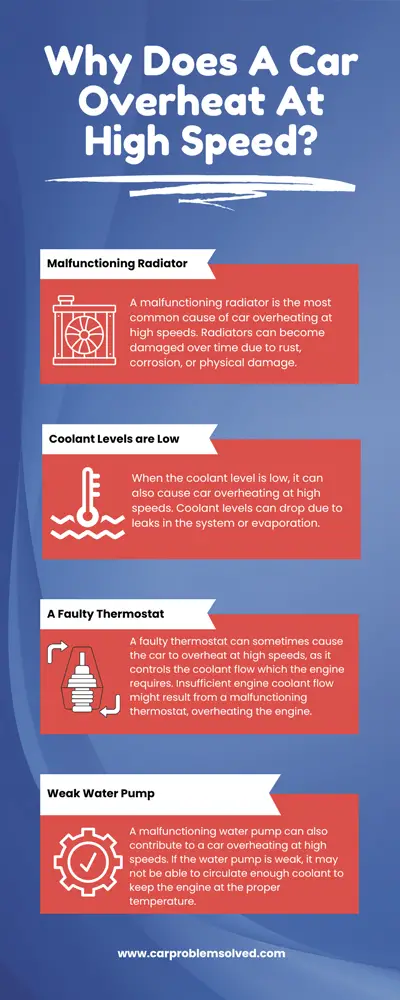
Here are the problems and the solutions discussed in brief.
1. Malfunctioning Radiator
A malfunctioning radiator is the most common cause of car overheating at high speeds. Radiators can become damaged over time due to rust, corrosion, or physical damage.
This may result in leaks, which will lower the amount of coolant in the engine plus increase the risk of overheating.
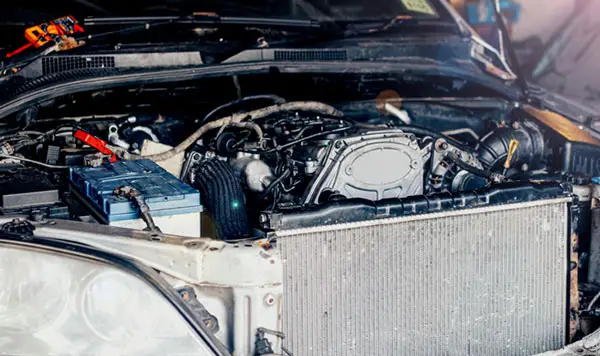
Potential Fixes
if the radiator shows abnormalities, the only solution is to replace it. A malfunctioning radiator replacement will fix this problem.
However, replacing a radiator is not cheap, you may end up paying $4000 more or less. And to unclog a radiator may cost between $200 and $400 only.
2. Coolant Levels are Low
When the coolant level is low, it can also cause car overheating at high speeds. Coolant levels can drop due to leaks in the system or evaporation. It’s important to check your coolant levels and top them off regularly. It is needed to ensure that your engine stays cool.
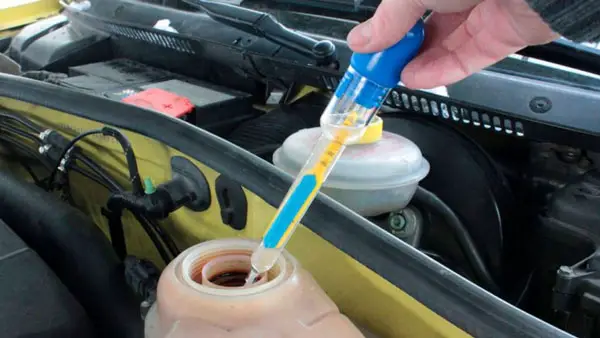
Potential Fixes
This issue can be resolved by topping off the coolant levels in the engine. Typically, the coolant reservoir is situated close to the engine. This is specified with a “low coolant” or “minimum” level.
Also, it’s crucial to use the appropriate kind of coolant for your specific car found in the vehicle’s owner’s manual.
Keep in mind it may be a temporary solution. If the cooling mechanism is damaged, you have to consult a mechanic as soon as possible.
3. A Faulty Thermostat
A faulty thermostat can sometimes cause the car to overheat at high speeds, as it controls the coolant flow which the engine requires. Insufficient engine coolant flow might result from a malfunctioning thermostat, overheating the engine.
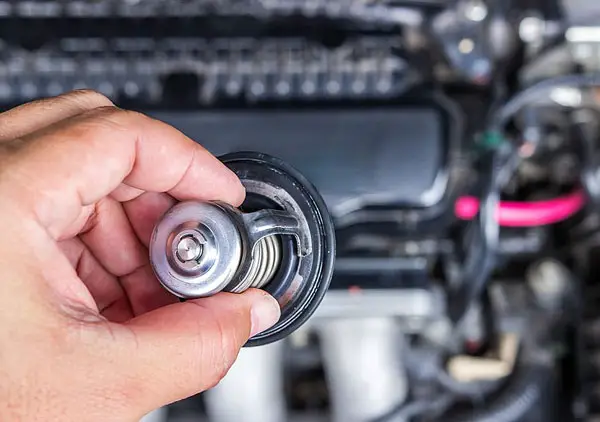
Potential Fixes
A faulty thermostat will need to be replaced to fix this problem. A technician will check the engine temperature and compare it to the thermostat’s readout. If they do not match, the thermostat is likely faulty and should be replaced.
A thermostat replacement or repair may cost around $250, including all additional charges like a mechanic or transportation if required.
4. Weak Water Pump
A malfunctioning water pump can also contribute to a car overheating at high speeds. If the water pump is weak, it may not be able to circulate enough coolant to keep the engine at the proper temperature.
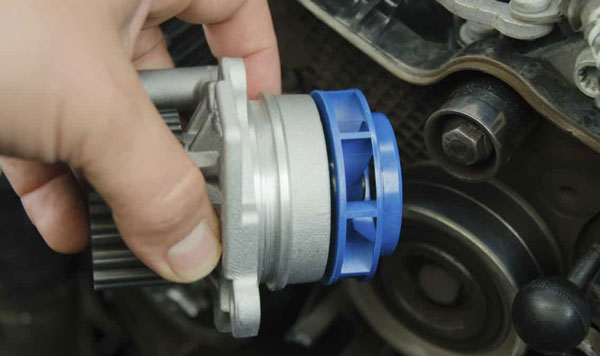
Potential Fixes
To fix a weak water pump, the old pump will need to be removed and replaced with a new one. This is a complex process that requires specialized tools and knowledge. It is therefore advisable to have a qualified mechanic handle it.
Once the new water pump is installed, the coolant level should be checked for any other leaks, and the engine should be run to check the water pump’s performance.
If the engine is running at the proper temperature and the coolant flow and pressure are back to normal, the repair is considered successful.
There are some other causes, including a damaged air filter or malfunctioning fan clutch. In this case, you need to consult a technician. if any replacement is needed, the mechanic will suggest you.

FAQs
You should read through this area in case you have any more questions.
A: Yes, a blocked air conditioning condenser can cause cars to overheat at high speeds. The condenser helps the refrigerant release heat in the air conditioning system. If it’s blocked, it can’t release the heat efficiently, which may cause the engine to overheat.
A: Yes, a failed oil cooler may cause high-speed overheating as it helps to remove heat from the engine oil. If the oil cooler fails to function properly, the engine oil may become excessively hot, causing the engine to overheat.
A: Yes, you may do this. Rapid acceleration and sudden stops can put a significant amount of stress on the engine. To prevent this, it’s best to anticipate the actions of other drivers on the road and avoid sudden braking.
Conclusion
To sum up, the cause of a car overheating at high speeds can be attributed to various factors. If your vehicle begins to overheat while driving at high speeds, it should be stopped immediately. A thorough inspection of specific components should be conducted if your car starts overheating.
The radiator, coolant system, and thermostat are typically the first areas to check when a car overheats. Likewise, you may reduce strain on the engine by maintaining a steady and slower pace.
